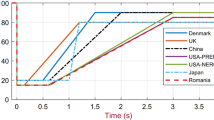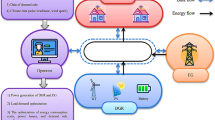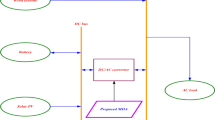Abstract
Curbing CO2 emission is required for the global warming reduction effect. Human civilization is moving toward renewable sources to achieve this as early as possible. The electrical energy requirement increases day by day as with population and industrial growth. Therefore, more electrical energy saving and proper utilization of electricity are becoming essential. Nowadays researchers are moving toward, developing and demonstrating net zero emission (CO2 emission) renewable energy sources (like solar energy, wind power, Hydro plant and more) technologies. However, incorporating those energy sources in the electrical power grid, the grid becomes hybrid and complex. It is necessary for economic load dispatch (ELD) requirements that the hybrid grid must be optimized as well as utilized efficiently that results economical efficient energy saving. In this article, we contribute a solution toward efficient optimization applicable to moderate size generating stations (using renewable source for hybrid grid network). The presented work fulfills ELD requirement using hybrid harmony search and modified harmony search optimization. Renewable energy sources are a suitable options to meet the contingencies in conventional methods of electricity generation. Wind and geothermal power have the all-time availability and thus are the favorable clean energy sources. However, wind’s discontinuous behaviors effecting grid systems with unpredictable injection of power becomes a vital challenge to maintain good quality of the grid. Here the ELD requirement is prepared with the addition of renewable energy (wind) generation cost and thermal units. The penalty costs are being added for renewable power because of variability and uncertainty. Hybrid harmony search, ant colony, modified harmony search optimization and PSO are applied to the wind and thermal generating units (hybrid network) with an objective to get generation cost minimum to fulfill customer requirement. The proposed estimation is applied in twenty six Bus systems and simulation output data acquired with those optimization methods are compared among each other.






Similar content being viewed by others
Data availability statement
The datasets analyzed during the current study are available in the IEEE repository, https://ieeexplore.ieee.org/document/7470712.
References
Lu M, Chang C, Lee W, Wang L (2009) Combining the wind power generation system with energy storage equipment. IEEE Trans Ind Appl 45(6):2109–2115
Wu C, Zhang X-P, Sterling M (2022) Wind power generation variations and aggregations. CSEE J Power Energy Syst 8(1):17–38. https://doi.org/10.17775/CSEEJPES.2021.03070
Shu Z, Jirutitijaroen P (2014) Optimal operation strategy of energy storage system for grid-connected wind power plants. IEEE Trans Sustain Energy 5(1):190–199. https://doi.org/10.1109/TSTE.2013.2278406
Zhang Z, Zhang Y, Huang Q, Lee W (2018) Market-oriented optimal dispatching strategy for a wind farm with a multiple stage hybrid energy storage system. CSEE J Power Energy Syst 4(4):417–424. https://doi.org/10.17775/CSEEJPES.2018.00130
Opathella C, Venkatesh B (2013) Managing uncertainty of wind energy with wind generators cooperative. IEEE Trans Power Syst 28(3):2918–2928. https://doi.org/10.1109/TPWRS.2012.2233502
Bhattacharjee K, Patel N (2020) A comparative study of Economic Load Dispatch with complex non-linear constraints using Salp Swarm Algorithm. Int J Sci Technol Sci Iran. https://doi.org/10.24200/SCI.2020.52145.2562
Bhattacharjee K (2018) Economic dispatch problems using backtracking search optimization. Int J Energy Optim Eng IGI-Global 7(2):39–60. https://doi.org/10.4018/IJEOE.2018040102
Roy S, Bhattacharjee K, Bhattacharya A (2016) A modern approach to solve of economic load dispatch using group leader optimization technique. Int J Energy Optim Eng IGI-Global 6(1):66–85. https://doi.org/10.4018/IJEOE.2017010104
Bhattacharjee K, Bhattacharya A, Dey SHN (2014) Oppositional real coded chemical reaction optimization for different economic dispatch problems. Int J Electr Power Energy Syst (Elsevier) 55:378–391
Bhattacharjee K, Bhattacharya A, Dey SHN (2014) Chemical reaction optimisation for different economic dispatch problems. Gen Transm Distrib IET 8(3):530–541
Bhattacharjee K, Patel N (2018) A comparative study of economic load dispatch using sine cosine algorithm. Int J Sci Technol Sci Iran. https://doi.org/10.24200/sci.2018.50635.1796
Bhattacharjee K, Patel N (2019) An experimental study regarding economic load dispatch using search group optimization. Int J Sci Technol Sci Iran. https://doi.org/10.24200/sci.2019.51798.2367
Bhattacharjee K, Bhattacharya A, Dey SHN (2014) Teaching Learning Based Optimization for Different Economic Dispatch Problems. Int J Sci Technol 21(3):870–884
Bhattacharjee K, Bhattacharya A, Chattopadhyay PK (2013) Discussion on “A GA-API solution for the economic dispatch of generation in power system operation.” IEEE Trans Power Syst 28(1):570–571
Dubey HM, Pandit M, Panigrahi BK (2015) Hybrid flower pollination algorithm with time-varying fuzzy selection mechanism for wind integrated multi-objective dynamic economic dispatch. Renew Energy 83:188–202. https://doi.org/10.1016/j.renene.2015.04.034
Dubey HM, Pandit M, Panigrahi BK (2018) An overview and comparative analysis of recent bio-inspired optimization techniques for wind integrated multi-objective power dispatch. Swarm Evol Comput 38:12–34. https://doi.org/10.1016/j.swevo.2017.07.012
Dubey SM, Dubey HM, Pandit M, Salkuti SR (2021) Multiobjective scheduling of hybrid renewable energy system using equilibrium optimization. Energies 14(19):6376. https://doi.org/10.3390/en14196376
Dubey SM, Dubey HM, Salkuti SR (2022) Modified quasi-opposition-based grey wolf optimization for mathematical and electrical benchmark problems. Energies 15:5704. https://doi.org/10.3390/en15155704
Tiwari V, Dubey HM, Pandit M, Salkuti SR (2022) CHP-based economic emission dispatch of microgrid using Harris Hawks optimization. Fluids 7:248. https://doi.org/10.3390/fluids7070248
Srivastava A, Singh S (2020) Implementation of ant colony optimization and particle swarm optimization in economic load dispatch problem using renewable source. In: IEEE 17th India council international conference (INDICON), pp 1–6. https://doi.org/10.1109/INDICON49873.2020.9342190.
Al-Awami AT, Sortomme E, El-Sharkawi MA (2009) Optimizing economic/environmental dispatch with wind and thermal units. IEEE Power Energy Soc Gen Meet 2009:1–6. https://doi.org/10.1109/PES.2009.5275667
Biswas PP, Suganthan PN, Amaratunga GAJ (2017) Optimal power flow solutions incorporating stochastic wind and solar power. Energy Convers Manag 148:1194–1207
Kennedy J, Eberhart R (1995) Particle swarm optimization. In: Proceedings of ICNN'95—international conference on neural networks, vol 4, pp 1942–1948. https://doi.org/10.1109/ICNN.1995.488968
Shami TM, El-Saleh AA, Alswaitti M, Al-Tashi Q, Summakieh MA, Mirjalili S (2022) Particle swarm optimization: a comprehensive survey. IEEE Access 10:10031–10061. https://doi.org/10.1109/ACCESS.2022.3142859
Deep K, Bansal JC (2018) Solving economic dispatch problems with valve-point effects using particle swarm optimization. J Univ Comput Sci 18(13):1842–1852. https://doi.org/10.3217/jucs-018-13-1842
Ciuprina G, Ioan D, Munteanu I (2002) Use of intelligent-particle swarm optimization in electromagnetics. IEEE Trans Magn 38(2):1037–1040. https://doi.org/10.1109/20.996266
Storn R, Price K (1997) Differential evolution—a simple and efficient heuristic for global optimization over continuous spaces. J Global Optim 11:341–359. https://doi.org/10.1023/A:1008202821328
Rabiee A, Mohammadi-Ivatloo B, Ehsan M (2012) Discussion of hybrid differential evolution with biogeography-based optimization for solution of economic load dispatch. IEEE Trans Power Syst 27(1):574–574. https://doi.org/10.1109/TPWRS.2011.2176591
Dorigo M, Maniezzo V, Colorni A (1996) Ant system: optimization by a colony of cooperating agents. IEEE Trans Syst Man Cybern Part B (Cybern) 26(1):29–41. https://doi.org/10.1109/3477.484436
Mulo T, Syam P, Choudhury A (2020) Application of modified harmony search and differential evolution optimization techniques in economic load dispatch. In: Advances in control, signal processing and energy systems: select proceedings of CSPES 2018, Springer, Singapore. pp 199–213. https://doi.org/10.1007/978-981-32-9346-5_16.
Yang GY, Dong ZY, Wong KP (2008) A modified differential evolution algorithm with fitness sharing for power system planning. IEEE Trans Power Syst 23(2):514–522. https://doi.org/10.1109/TPWRS.2008.919420
Salaria UA, Menhas MI, Manzoor S (2021) Quasi oppositional population based global particle swarm optimizer with inertial weights (QPGPSO-W) for solving economic load dispatch problem. IEEE Access 9:134081–134095. https://doi.org/10.1109/ACCESS.2021.3116066
Mulo T, Syam P, Choudhury AB (2018) Economical load dispatch using modified harmony memory search optimization technique. In: 2018 5th IEEE Uttar Pradesh section international conference on electrical, electronics and computer engineering (UPCON), 2018, pp 1–6, https://doi.org/10.1109/UPCON.2018.8596973.
Kim MJ, Song H-Y, Park J-B, Roh J-H, Lee SU, Son S-Y (2013) An improved mean-variance optimization for nonconvex economic dispatch problems. J Electr Eng Technol 8(1):80–89
Vlachogiannis JG, Lee KY (2010) Closure to discussion on “economic load dispatch—a comparative study on heuristic optimization techniques with an improved coordinated aggregation-based PSO. IEEE Trans Power Syst 25(1):591–592. https://doi.org/10.1109/TPWRS.2009.2037534
Geem ZW, Kim JH, Loganathan GV (2001) A new heuristic optimization algorithm: harmony search. SIMULATION 76(2):60–68. https://doi.org/10.1177/003754970107600201
Lee KS, Geem ZW (2005) A new meta-heuristic algorithm for continuous engineering optimization: harmony search theory and practice. Comput Methods Appl Mech Eng 194(36–38):3902–3933. https://doi.org/10.1016/j.cma.2004.09.007
Saddat H (1998) Power system analysis. Tata McGraw Hill Publishing Co Ltd, New York
Funding
The authors declare that they don’t have any funding support.
Author information
Authors and Affiliations
Contributions
In this research work, the algorithm development and paper writing are done by Mr. Tanmoy Mulo. The problem identification and conceptual validation are done by Dr. Prasid Syam and Dr. Amalendu Bikash Choudhury.
Corresponding author
Ethics declarations
Conflict of interest
The authors declare that they have no competing interests.
Human and animal rights
The authors declare that the study of this paper is not related to humans and animals.
Additional information
Publisher's Note
Springer Nature remains neutral with regard to jurisdictional claims in published maps and institutional affiliations.
Rights and permissions
Springer Nature or its licensor (e.g. a society or other partner) holds exclusive rights to this article under a publishing agreement with the author(s) or other rightsholder(s); author self-archiving of the accepted manuscript version of this article is solely governed by the terms of such publishing agreement and applicable law.
About this article
Cite this article
Mulo, T., Syam, P. & Choudhury, A.B. Hybrid and Modified Harmony Search Optimization application in economic load dispatch with integrated renewable source. Electr Eng 105, 1923–1935 (2023). https://doi.org/10.1007/s00202-023-01770-1
Received:
Accepted:
Published:
Issue Date:
DOI: https://doi.org/10.1007/s00202-023-01770-1




